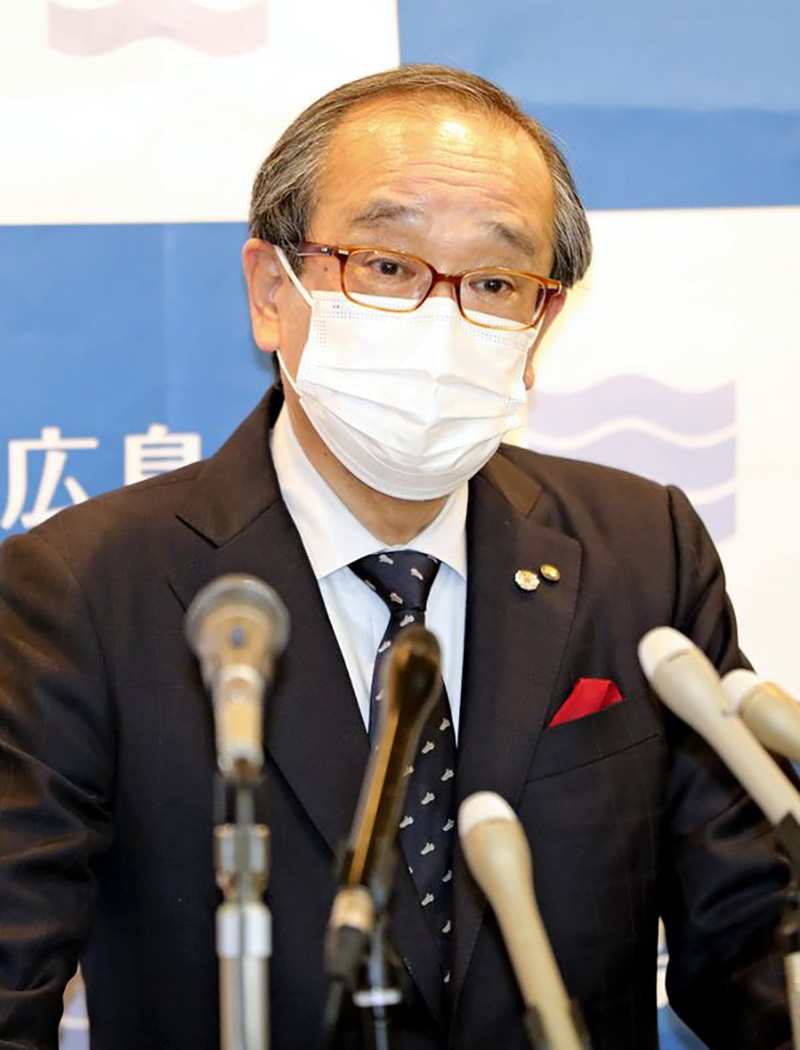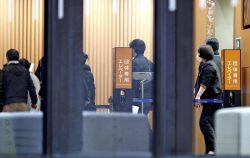
Hiroshima Mayor Kazumi Matsui expresses his intention to accept the central government’s proposed relief measures during a press conference at city hall on Dec. 24.
15:48 JST, December 30, 2021
HIROSHIMA — The central government has decided to greatly increase the scope of its relief measures for people who were exposed to radioactive black rain that fell on Hiroshima in the wake of the atomic bombing by the United States on Aug. 6, 1945.
However, the expanded relief measures do not apply to black rain survivors in Nagasaki, the city over which the United States dropped another atomic bomb on Aug. 9, 1945.
The central government plans to continue negotiations on the issue with the Nagasaki prefectural and city governments in the coming years.
The formal decision by the Health, Labor and Welfare Ministry on Monday calls for granting eligibility for aid to more people in Hiroshima. The requirements are being significantly eased so that people outside a state-designated relief zone who were exposed to the black rain will also be recognized as hibakusha, or victims of the atomic bombings. This means possibly over 10,000 people will be eligible for aid.
Disease requirement
“First of all, we will aid those whom we can,” Hiroshima Gov. Hidehiko Yuzaki said.
The negotiations between the central government and the Hiroshima prefectural and city governments on the aid measures moved quickly because of a ruling by the Hiroshima High Court in July 2021. The court recognized as hibakusha all 84 plaintiffs who claimed they were exposed to black rain outside the relief zone.
The central government decided not to appeal the ruling to the Supreme Court. It then started negotiations with the Hiroshima prefectural and city governments and the Nagasaki prefectural and city governments to discuss how to aid people in situations similar to those of the plaintiffs.
The central government proposed guidelines to recognize a person exposed to black rain as hibakusha with the condition that the person also suffers from at least one of 11 specific diseases such as cancer.
Regarding whether a person was exposed to black rain, the parties reached consensus at an early stage that this would be recognized if the testimony of the victim, the person’s family register or certificates of school enrollment, among other materials, cannot be refuted.
As for the condition on having a specific disease, the central government stuck to this position, while the prefectures and cities have maintained that it is unnecessary. As a result, the negotiations temporarily did not go smoothly.
July ruling
The atomic bomb survivors relief law acknowledges people as hibakusha if they were in circumstances in which they were likely to have come under the effects of radiation. Hibakusha certificates are issued to these people and they can present them to receive free medical treatment.
The central government has maintained that specific diseases are necessary as a requirement to recognize people as hibakusha on the grounds that if they suffer such diseases, no one can say that they did not come under the effects of radiation. A senior health ministry official said that there were concerns that if the disease requirement was removed, the scope of the relief measures could be indefinitely expanded.
The High Court ruling in July said that the disease requirements run counter to the spirit of the law to widely aid hibakusha, concluding that, unless damage to people’s health caused by radiation can be refuted, these people should be deemed hibakusha even if they are not suffering from specific diseases.
Based on this, the Hiroshima prefectural and city governments strongly demanded that the disease requirements be removed. As more than 76 years have passed since the atomic bombing, the people to which the aid measures apply are aging.
The central government and the Hiroshima prefectural and city governments reached a compromise by making cataract surgery an eligible disease.
In the case filed by 84 plaintiffs in Hiroshima, some had had cataract surgery. In addition, a 2002 survey report by the health ministry’s research team said that 84-97% of people in their 70s and 100% of people in their 80s or older have symptoms of suspected cataracts.
According to the Hiroshima city government, the survivors in areas where the plaintiffs and others had lived are estimated at about 13,000 as of 2020. With cataract surgery added to the disease requirement, most of the 13,000 people would be eligible for aid, perhaps over 10,000 people.
Hiroshima Mayor Kazumi Matsui said, “I will not agree to the proposal, but I will not oppose it.”
Nagasaki’s case
Regarding Nagasaki, the central government said that it is difficult to treat the case in the same manner as Hiroshima because there are no objective materials that prove that black rain fell there.
The central government intends to continue negotiations with the Nagasaki prefectural and city governments in 2022 or later. However, as there no yardsticks such as the Hiroshima High Court ruling, the negotiations are not expected to go smoothly.
On Monday, the Nagasaki prefectural and city governments replied to the central government that they would not accept the proposed relief measures this time because the measures are limited to Hiroshima.
At a press conference, a section chief at the Nagasaki prefectural government in charge of relief for atomic bomb victims strongly decried the central government’s attitude, saying that the proposed measures would force struggling hibakusha survivors to file new lawsuits over whether they were exposed to black rain.
In Hiroshima as well, there is criticism that the measures will create division between people who do not suffer from the 11 specific diseases or have not had cataract surgery and people newly eligible for aid.
Hiroshima Gov. Yuzaki said, “I will continue to demand that the central government removes the disease requirements.”
Top Articles in Society
-

Man Infected with Measles Reportedly Dined at Restaurant in Tokyo Station
-

Man Infected with Measles May Have Come in Contact with Many People in Tokyo, Went to Store, Restaurant Around When Symptoms Emerged
-

Woman with Measles Visited Hospital in Tokyo Multiple Times Before Being Diagnosed with Disease
-

Australian Woman Dies After Mishap on Ski Lift in Nagano Prefecture
-

Foreign Snowboarder in Serious Condition After Hanging in Midair from Chairlift in Nagano Prefecture
JN ACCESS RANKING
-

Japan PM Takaichi’s Cabinet Resigns en Masse
-

Japan Institute to Use Domestic Commercial Optical Lattice Clock to Set Japan Standard Time
-

Israeli Ambassador to Japan Speaks about Japan’s Role in the Reconstruction of Gaza
-

Man Infected with Measles Reportedly Dined at Restaurant in Tokyo Station
-

Videos Plagiarized, Reposted with False Subtitles Claiming ‘Ryukyu Belongs to China’; Anti-China False Information Also Posted in Japan





















